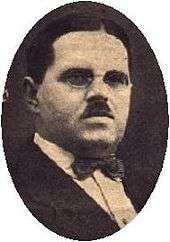Leonid Kubbel

Leonid Ivanovich Kubbel (Russian: Леонид Иванович Куббель) was a Russian composer of chess endgame studies and problems.
He was born in Saint Petersburg at the end of 1891, or beginning of 1892[1] and died in the same city (then called Leningrad) on 18 April 1942. He was christened Karl Artur Leonid, but amended his forenames to Leonid Ivanovich subsequent to the 1917 October Revolution.[2]
He composed more than 1500 endgame studies and problems, many of which were awarded first prize for their great beauty and original conception. He is generally considered one of the greatest of all endgame composers. He was a chemical engineer by profession.
Leonid's brothers, Arvid and Evgeny, were also chess players. Arvid Kubbel was a strong over the board master, having played in the first four USSR chess championships, while Evgeny was himself an endgame composer. Both Leonid and Evgeny Kubbel died of starvation in 1942 during the Nazi siege of Leningrad, while Arvid was executed by the NKVD in 1938.[3]
A study by Leonid Kubbel
This is one of Leonid Kubbel's many masterpieces. The Black a-pawn apparently cannot be stopped from promotion, after which the game would be lost for White; however, a subtle plan avoids defeat and checkmates the black king. Video analysis of this study can be found here on YouTube.
Schachmatny Listok 1922
| a | b | c | d | e | f | g | h | ||
| 8 |  | 8 | |||||||
| 7 | 7 | ||||||||
| 6 | 6 | ||||||||
| 5 | 5 | ||||||||
| 4 | 4 | ||||||||
| 3 | 3 | ||||||||
| 2 | 2 | ||||||||
| 1 | 1 | ||||||||
| a | b | c | d | e | f | g | h | ||
Solution:
- 1. Nc6!! (threatens Nb4+, blocking the a-pawn) Kxc6
- 2. Bf6 Kd5
- 3. d3 a2
- 4. c4+ Kc5(4....dxc3 5.Bxc3 is a simple technical win)
- 5. Kb7! a1=Q (if 5...Kd6 or 5... Kb4 then 6.Bxd4 stopping the pawn)
- 6. Be7 checkmate.
Works on Leonid Kubbel
- 25 ausgewählte Endspielstudien von Leonid Kubbel (German), Jan van Reek, 1996.
- Leonid Kubbel’s Chess Endgame Studies, TG Whitworth, 2004.
- Леонид Куббель (Russian), J. Vladimirowitsch and Y.Fokin, 1984.
External links
References
- ↑ Gaige, Jeremy (1987). Chess Personalia, A Biobibliography. McFarland. p. 231. ISBN 0-7864-2353-6. Gaige suggests that there is some evidence in support of 6 January 1892
- ↑ Biographical data Endgamestudy composers
- ↑ Журнал о шахматах - здесь Вы найдете статьи, советы, рассказы о шахматах и шахматистах
- Preface by Grigory Levenfish in: "K.A.L. Kubbel Schachmatnich etjudov: 150 Endgame Studies", Leningrad, 1925 (Russian).